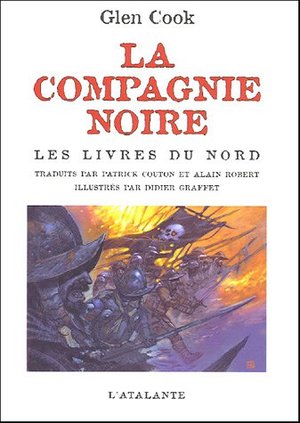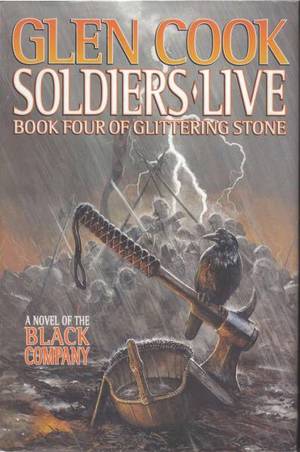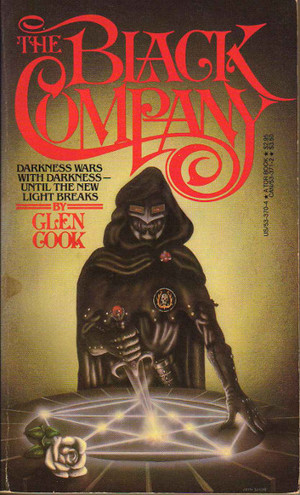VIVE LA COMPAGNIE! : In Conclusion, The Black Company Series by Glen Cook
As soon as I opened The Black Company last May, I knew I was back home among a band of brothers I’d first met and come to love over thirty years ago.
– Fletcher Vredenburgh
When my friend Carl lent me his copy of The Black Company back in 1984 I didn’t know what was about to hit me. I had read some gritty fantasy previously — Michael Moorcock and Karl Edward Wagner in particular had published some pretty dark stories in the 1960s and 70s — but it was all written in the old familiar fantasy style. Both Moorcock and Wagner were rooted in the foundations of swords & sorcery laid by Robert E. Howard, CL Moore, and Fritz Leiber. No matter how callous their heroes, they were ultimately still cut from recognizable heroic cloth.
Cook introduced something new. He set aside the archaic prose flourishes of all those authors, instead drawing on hardboiled fiction to give his stories a contemporary feel. There’s a rejection of the mythic, fairytale setting in the Black Company books, and a wholehearted embrace of a “realistic” world where the battlefield reeks of blood, excrement, and decay. Mercenaries pillage, rape, and slaughter, presented in some detail and matter-of-factly. Even seen through the primary narrator’s somewhat romantic eyes, there’s a businesslike miserableness in these books I hadn’t previously encountered in fantasy. As soon as I finished the book I passed it on to to my friend Jim, he passed it on to George, and on and on it went until all my fantasy-reading friends had read it.
For the uninitiated, the Black Company series tells the story of the Last Free Company of Khatovar. Led by the eponymous Captain and Lieutenant, the Company can fight with the best of them, but prefers to outwit its enemies and win its battles by means of subterfuge and sabotage. The narrator, Croaker, serves as company surgeon and Annalist. For four centuries the Company has taken one contract after another, slowly working its way north from long-forgotten Khatovar. As the first book opens, they are approached by a mysterious masked figure offering a new contract even further north, across the sea. Within the first chapter everything changes for the Company, and they are embroiled in a war like they’ve never fought before.
For readers unfamiliar with The Black Company, but up-to-date on Martin, Abercrombie, and Bakker, this might sound old hat. Trust me when I tell you that it wasn’t. At seventeen, that first book hit me like a hammer between the eyes. Here were characters who essentially went to work for Sauron’s ex-wife. Over the course of the first and second books they became the baddest, most-feared band of killers in her army. The ostensible good guys are as vicious and murdering as anybody on the bad guys’ side. There’s a bit of moral redemption in the third book, but what really drives the protagonists is a deep self-interest in survival. To paraphrase Raymond Chandler, Cook took heroic fantasy out of the realm of faerie and put it into the bleak world where it belonged.
 The shock of the new was definitely part of what made the books so enticing to me and my friends. That, though, wasn’t what brought me back again and again over the years. What did that was Cook’s supreme talent as a teller of tales. The books are jammed with characters who have called out to me clearly over the years. One encounter with Goblin and One-Eye, and no reader will forget them or their bloody stupid antics. The same goes for Croaker and his pining for the luminous Lady; Marron Shed’s descent into the darkest parts of his own heart; Mogaba’s sins at Dejagore. As soon as I opened The Black Company last May, I knew I was back home among a band of brothers I’d first met and come to love over thirty years ago.
The shock of the new was definitely part of what made the books so enticing to me and my friends. That, though, wasn’t what brought me back again and again over the years. What did that was Cook’s supreme talent as a teller of tales. The books are jammed with characters who have called out to me clearly over the years. One encounter with Goblin and One-Eye, and no reader will forget them or their bloody stupid antics. The same goes for Croaker and his pining for the luminous Lady; Marron Shed’s descent into the darkest parts of his own heart; Mogaba’s sins at Dejagore. As soon as I opened The Black Company last May, I knew I was back home among a band of brothers I’d first met and come to love over thirty years ago.
Cook got, and still gets, a lot of grief for his supposed lack of worldbuilding. The thing is, the world of The Black Company is one that feels completely believable no matter how big the magic gets or how epic the world-threatening events become. Cook doesn’t just ask his readers to suspend their disbelief, he works hard to make that an easy task by describing a world that feels as real as the real one.
Finally, in a genre burdened with plenty of prolix authors, Cook writes economically. There’s none of the attention lavished on scenery, big declarative speeches, or side plots favored by so many fantasy authors. Instead, he keeps his story blazing along, only losing his way in parts of the later books. Dialogue is terse, with few characters ever saying more than one would expect them to realistically, and never with any poetry beyond that of people living in times of great crisis.
 The reread of and writing about the series appeared at the beginning to be a more daunting endeavor than it actually was. Together, the ten books total over 3,500 pages, cover forty years, feature four separate narrators, and dozens and dozens of secondary characters. That would seem like a laborious undertaking, but it wasn’t.
The reread of and writing about the series appeared at the beginning to be a more daunting endeavor than it actually was. Together, the ten books total over 3,500 pages, cover forty years, feature four separate narrators, and dozens and dozens of secondary characters. That would seem like a laborious undertaking, but it wasn’t.
I’d been wanting for years to read this series front to back in one go. The later books in the series were released with long intervals between them. After the fifth book, things started to get incredibly confusing. Without the luxury of having just finished one book before starting the next, it had been very easy to lose track of what was going on. This time around that wasn’t the case. The later books get a bad rap. That’s not entirely unfair, but reading them like I just did, it was easier to appreciate what Cook was doing: telling the story of the Black Company over four decades, as it shifted and morphed from one thing to another, without ever losing the soul of what made it what it was.
Two weeks ago, after three and a half months, I reached the end of Soldiers Live, the last of Glen Cook’s Black Company series. Now, of course, with all my work done, suddenly there’s a brand new book. Nearly twenty years after the last one, Cook has decided to wade back into the icy cold waters of his groundbreaking series. Port of Shadows, set between the first and second books — The Black Company and Shadows Linger — arrived on my door step last Tuesday, and I’ll probably be reading it before October’s end. Like Cook, I’ve been drawn back to these books countless times over the years, but never before have I done what I did this time and read them all in a row. It took a lot of time, but never once did it feel like a chore. Instead, it was an exciting return to one of my favorite authors and some of the books most influential on the direction of modern epic fantasy.
If you haven’t read the Black Company, go right now and snag the first book. Not only will you see where today’s fantasy trends started, you’ll have picked up a truly terrific book that, for me, has stood up to several rereads. If you’ve read them, then go see my reviews of the entire series at the links below, and let me know what you think about the books.
The Black Company (1984)
Shadows Linger (1984)
The White Rose (1985)
The Silver Spike (1989)
Shadow Games(1989)
Dreams of Steel (1990)
Bleak Seasons (1996)
She Is the Darkness (1997) Part 1
She is the Darkness (1997) Part 2
Water Sleeps (1999) Part 1
Water Sleeps (1999) Part 2
Soldiers Live (2000) Part 1
Soldiers Live, Part 2

It was great reliving the series through your reviews Fletcher.
A warning to some. Unless you are a completist, don’t make the mistake I did. Years back I tracked down the August 1982 F&SF just to read the Black Company short story. Only when I read it did I discover same story is a chapter in the first book.
Nice review! I believe I reread the series over and over again each time a new book came out in the 90’s. Awesome series!
Quick note about Port of Shadows, it is set between the first and second books of the series, not the second and third as mentioned above,
It also incorporates the short stories “Tides Ebla”, “Smelling Danger” and “Bone Candy”. These stories all take place while the Black Company are still in service to the Lady.
The book also has a comment where “The Pitiless Rain” is mentioned, one of Glen Cook’s vices is to sneek the title of the next book into the current book.
Since the last two short stories (“Shaggy Dog Bridge” and “Bone Eaters”) both take place after Shadows Linger and Before The White Rose, I think the next book (The Pitiless Rain) will fall within that period as well.
Hopefully the wait will not be another twenty years…..
@usagigoya – First, thanks for the heads up. I knew where Port was placed but somehow I wrote the wrong thing. D’oh! Second, thanks for the kind words.